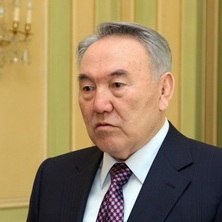Recently, I wrote a PONARS Eurasia policy memo about what I termed an “unlikely succession struggle” in Kazakhstan. In this paper, I noted that, despite the popularity of President Nursultan Nazarbayev and the fact that he recently won another term as president, Kazakhstan’s public has become obsessed with the prospect of presidential succession in the country. This obsession is fueled by the natural limits of 73-year old Nazarbayev’s mortality and the lack of any clear mechanisms for leadership succession in the country’s political experience since independence (which has been dominated exclusively by Nazarbayev himself, the country’s first and only president).
This phenomenon is important because Central Asia is not a region that is very comfortable with public political discourse. With the exception of Kyrgyzstan, none of the countries in the region have experienced fair and competitive elections. Furthermore, in all countries including Kyrgyzstan, politics are seen as the domain of individual personalities rather than of political parties, which have yet to really form along any discernible ideological lines. In this context, most people in the region imagine presidential succession both as being a competition between powerful personalities and as not involving the choice of the population. This perspective, however, does not prevent people in Central Asia from discussing the possible candidates to succeed their present leaders.
Although there are hints of such a public discourse about presidential succession in Uzbekistan, as witnessed by the spreading of a recent rumor that Islam Karimov had died, such public discussions about the political future are much more widespread in Kazakhstan. Indicative of this public discourse about succession in Kazakhstan, a local company conducting political analysis, Рейтинг.кз, recently published its second annual “rating” of the most likely candidates to become the next President of Kazakhstan. Although the release of such a study would hardly be newsworthy in the United States, Europe, or even in an emergent democracy such as Kyrgyzstan, this is a new phenomenon in Kazakhstan, where the media has usually shied away from even discussing the prospect of a Kazakhstan without Nazarbayev.
In seeking to understand the collective political consciousness of Kazakhstan, the methodology of this study may be more interesting than its results. It is noteworthy, for example, that data used in the analysis did not utilize public polling of citizens (after all, why would one consider popular opinion in a country where elections are assumed to have little meaning?). Instead, the analysis involved polling forty political analysis “experts,” who were asked to rank both potential candidates and the factors that could lead them to Kazakhstan’s “Ak Orda” (or White House).
Additionally, the experts’ answers to the question of which factors matter most in making somebody likely to succeed Nazarbayev are far more interesting than the ranking of specific individuals as potential candidates. Of nine factors, the most important was considered the trust of Nazarbayev himself, followed by the candidate’s palatability to different interest groups and powerful elites within the country. These were followed in order by: 3) political influence; 4) the presence of close associates in the highest echelons of power; 5) influence in the security organs; 6) ability to obtain the support of external powers, particularly among the leaders of world powers; 7) economic influence; and 8) professional abilities. Only after all of these factors, did the “experts” consider the importance of familiarity and popularity within society.
As a result, the findings in terms of most likely successors to Nazarbayev are not too surprising. Nurtai Abykaev, a long-time confident of Nazarbayev, is considered the most likely successor, followed by Karim Masimov, who recently worked as Kazakhstan’s longest running prime minister and now is the chief of the President’s office. Timur Kulibaev, Nazarbayev’s son-in-law and a powerful figure in the oil and gas industry, is ranked third, followed by Imangali Tasmagambetov, who has successfully run the country’s two largest cities, Almaty and Astana. Among the list of various confidents of President Nazarbayev that rank below these top three, it is notable that the president’s daughter, Dariga, only ranks the seventh most likely successor, and his nephew, Kairat Satybaldyuly ranks eighteenth.
What is most evident from this “parlor” analysis of Kazakhstan’s political “experts” is that they all still await a succession managed by Nazarbayev himself and involving exclusively his closest confidents and family members. No opposition politicians are ever mentioned in the twenty most likely successors, and there are no hints that the process of choosing the next president will involve any sort of popular plebiscite or overthrow of the existing political system. Such analysis generally makes sense for those inside Kazakhstan who have become accustomed to a form of governance where power is distributed by elite patronage networks, and they may be correct that presidential succession will not upset the status quo anytime soon.
However, if the Arab Spring has shown anything, it is that the stability of authoritarian regimes are never certain, even when they are run well and are rich in natural resources. If Nazarbayev is unable to manage his own succession due to the natural limits of human life, it is difficult to predict how ready Kazakhstan’s elite is to come to consensus on his replacement from amongst themselves. Furthermore, given the wealth and power in the country’s elite, it would not be surprising to see a protracted power struggle between various elite factions in Kazakhstan in the aftermath of a forced succession. Even if the experts polled for this study would agree with me on this point, it is also quite possible that the public discourse in Kazakhstan about succession is still not free flowing enough for them to say so in a public forum. Nonetheless, even the status quo discussion of succession in the present report from Рейтинг.кз suggests that this is a problem that continues to worry the people of Kazakhstan and that will be the biggest test of the country’s stability since independence.









